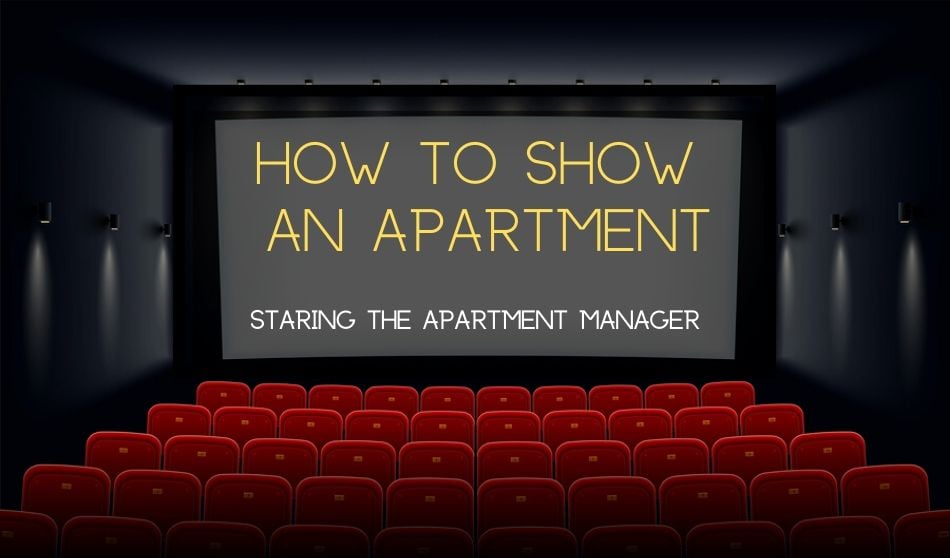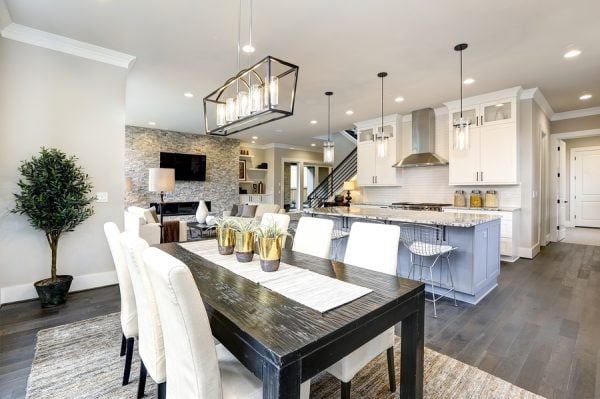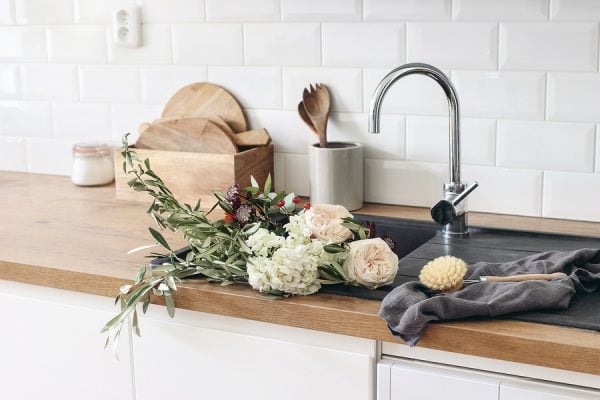
Showing a rental property to prospective tenants doesn’t have to feel like a horror movie or drama. Knowing how to show an apartment with these tips might turn this common landlord task into an enjoyable experience for all involved.
Step One – Marketing is the Pre-show for the Coming Attraction
Showing an apartment starts with marketing the availability. The pictures and description set the scene and can either pull the audience in or repel them.
Take some time to take some fantastic exterior photos and craft a compelling marketing copy about the benefits of living in your community, list of amenities, neighborhood features, and your company.
From there, you may want to have a write up drafted for the different types of apartments available with photos, floorplans, and blend them with the above template to save for future use.
Set the tone in your marketing to match the audience you’d like to reach.
High-end luxury apartments might call for a professional photographer to capture the details of a staged apartment. Drawing in the Millennials or Generation Z crowd, be sure to show pictures and describe areas for entertaining guests.

Show Rental Property – Some apartment complexes set aside a staged unit as a showcase for potential tenants. These are especially useful instead of showing an occupied apartment.
Many property management software systems allow you to save your photos and marketing copy to make posting to syndicated websites such as apartments.com, rent.com, and hotpads.com a breeze.
Step Two – Apartment Readiness
Tenant Occupied Rental
Pre-move out inspections are vitally important to allow you to see the condition of the unit to avoid any move-out surprises. Be sure to:
- Replace batteries in smoke alarms and CO2 detectors
- Replace burnt out light bulbs
- Check all electrical plugs and light switches
- Check the refrigerator for property seal and defrost freezer if necessary
- Oven and stove should be inspected as well as any other appliances
- Leaks can be a future problem so check toilet and faucet seals and under sinks for evidence for leaking
Vacant Apartment
Getting the apartment move-in ready involves making sure the apartment is spotlessly clean, and all items and appliances are working and in good repair.
One thing that may make the world of difference in getting that apartment lease is to stage the home – it doesn’t have to be elaborate or expensive. Simply add a few thoughtful touches and useful items around the home such as decorative towels in the kitchen and bathroom and flowers on the counter.
Appeal to the senses – open blinds and windows to freshen the apartment, use a room freshener that’s subtle and inviting, add a pop of color with a decorative welcome mat outside and a doormat inside (both will help keep your well swept and mopped floor clean).

Stage a vacant rental: Fresh flowers, kitchen utensils, and towels are a nice touch.
Step Three – Efficient and Effective Appointment Setting
Compelling listings and photos will reach those apartment hunting and the calls, emails, and texts will start pouring in. This is the time to start filling up your appointment book for the main attraction.
For a busy landlord, it may be best to create blocks of time. If the unit is vacant, consider appointments or an open house outside of normal business hours to accommodate prospective tenant work schedules.
Prospective tenants have likely done their homework and researched questions to ask when apartment hunting or questions to ask when renting an apartment and may hit you with those during your first phone conversation.
Be prepared for questions such as:
- How long does an apartment tour take?
- When is the apartment available?
- What is the total move-in costs?
- Are additional parking and storage available?
- Can we do an apartment viewing on the weekend or evenings?
In addition to their questions, having a list of pre-screening questions handy may help you pre-qualify the prospective tenant and avoid unnecessary apartment showings.
Remember your questioning should comply with the Fair Housing Act and not contain any wording that may be misunderstood as discriminatory.
Prescreening questions to ask:
- Are you looking for a short-term or long-term lease?
- How many people would be living with you?
- Are you familiar with our rental application process?
- How many pets do you have or expect to have?
- How many parking spaces would you require?
- Would you be able to provide proof of income that meets our income requirements?
- Is the total move-in amount available now?
These questions allow you to discuss the income requirements, pet limitations, parking, lease terms, the application process, and move-in costs all upfront.
For instance, if you require three times gross income to qualify there would be no need to make an appointment if they can not meet that requirement.
Your time is valuable and if they don’t qualify by either income, move-in costs, etc. then that saves everyone time.
Other questions allow you to have a discussion that sets expectations such as pet and parking policies from the start.
Be sure to ask the same questions of everyone to avoid even the appearance of discrimination or favoritism.
Step 4 – Showing an Apartment: Tips for the Big Day
The day has come for prospective tenants to tour the apartment. You and the apartment are now centerstage. Before your guests arrive you may want to:
- Turn on any lights that will showcase a room
- Open blinds and/or windows
- Sweep the unit
- Check for and remove cobwebs and dust
- Review and/or add staging items such as fresh flowers
Of course, you’ll want to be punctual, professional, and properly dressed. We shouldn’t judge people by our outward appearance, and yet — how you present yourself does tell a story to your potential tenants. If you are disheveled, you might not be taken seriously or lose the leasing opportunity altogether.
Your attention to detail might be a subtle sub-conscience indicator of how much attention to detail you’ll give to the rental process, maintenance and repair requests, and the community at large.
Set your apartment showing apart by providing a prospective tenant apartment shopping an information packet to take with them, which might include:
- A floor plan(s) to compare with other apartments
- Apartment community brochure with listed amenities
- A recent apartment community newsletter
- Neighborhood information such as shopping, schools, area parks

Remember to collect an interest card and take good notes during the rental showing. That information will be very useful on follow up.
Step Five – Follow Up is Key
If they haven’t jumped at the opportunity to fill out a rental application, be sure to have them fill out an interest card so you may follow up.
You now have gathered interest cards, perhaps some applications, and your notes (you did remember to take good notes, right?) then it’s time to organize and review that information. Be sure to follow up quickly to avoid losing an opportunity to fill the vacancy.
Be sure to follow all federal and state laws regarding communication frequency, purpose, and timing. Conduct background and credit checks when authorized, call all references, and review applications carefully. The more efficient and effective you are with this process, the faster the apartment will be leased.
BONUS Tips: Apartment Showing Etiquette
VACANT RENTALS
Be early shows respect for their time. It also allows you to check on the rental and be there for a proper greeting.
Greet your guests sincerely. No one wants the over-the-top cheesy car salesman. A warm, sincere smile and greeting go a long way to making the apartment shopper at ease. This might be their home so make them feel at home with your greeting.
Put your phone away. Unless you are using an online app to coordinate information with the prospect.
Smartphones are a distraction from being in the present moment and having a real human connection. That distraction not only hinders rapport but also can cause you to miss subtle body language or comments that offer important insight into who will potentially live in your community.
Common politeness includes not interrupting and providing good eye contact. Remember what your mama taught you – words like please, thank you, my pleasure, good question, glad you came, etc.. should flow freely.
Watch your body language. Your body language speaks volumes. What are you saying without words? Are your arms crossed, are you facing away from someone speaking to you, perhaps your feet are pointing to the door signaling silently you want to run?
Have empathy. Kindness is always the best apartment showing etiquette advice to offer. Apartment hunting isn’t typically a fun process. Change is difficult so show kindness by having empathy to put everyone at ease in a normally stressful situation.

Set the tone: Be friendly and sincere when greeting prospective tenants
OCCUPIED APARTMENTS
In addition to the etiquette to show your prospective tenants, if an apartment is occupied, you’ll want to take special care of how you interact and treat your current renters.
You’ll want to take extra care when handling a difficult tenant relationship.
If you are showing a leased property, only set appointments during normal business hours on weekdays unless you’ve come to a mutual agreement with your tenant for other days and times.
If the unit is still occupied by the current tenant, be sure to give them enough notice by-law of the approximate showing times. Check your state laws on how often and when you can enter a rental unit.
Politely ask the current renters to have any pets secured before arrival and to keep the unit tidy. Don’t wait to ask when you show up.
Communicate with the renter beforehand if you wish them to participate or are free to be uninvolved in the showing process. A happy renter may be your biggest asset, an unhappy one a liability.
On that note, communicate frequently your plans and set the expectations before the day arrives.
Offer incentives, rent abatement (concessions), gift certificates, etc. Showing gratitude for their cooperation can go a long way in a smooth transition.
Make sure any signage includes wording such as “Do Not Disturb Occupants – Shown by Appointment Only” to keep the current tenants from being unduly bothered.






Great article. We appreciate the series of relevant subjects that have been published recently. One thing I would add to the showing tips is to arrive early enough to have the temperature within the rental unit in the comfortable range. I’ve arrived at homes in the past to find the interior temperature like a meat locker. Prospects may then not feel like they want to stay to see the home, or might feel like they are considering a cold and unwelcoming home.
Thank you for those kind words and great feedback, Dean! Your input is spot-on and I couldn’t agree with you more. Too cold or hot in either direction can make for unfavorable conditions.
Very great post. I simply stumbled upon your blog and wanted to say Showing a rental property to prospective tenants. I like how you said that landlords and property managers should help their tenants protect themselves by educating them about proper security practices.
So glad you found us! Thanks for taking the time to share your feedback.
Hi Heather, Just wanted to extend our compliments to you for this article. We haven’t written on the subject, and I wanted to share more than my own opinion to a Newbie. I found your article well worth sharing to them. Keep up the good work!
Sam, thank you for taking the time to offer those kind words. That made my day!
Thank you for sharing this information how to show an apartment. It was useful and interesting. You indeed have written it in a layman way so that anyone can understand and work accordingly. You have done a great job.
It’s my pleasure to bring helpful tips and information to my industry friends. So, happy you found it useful.